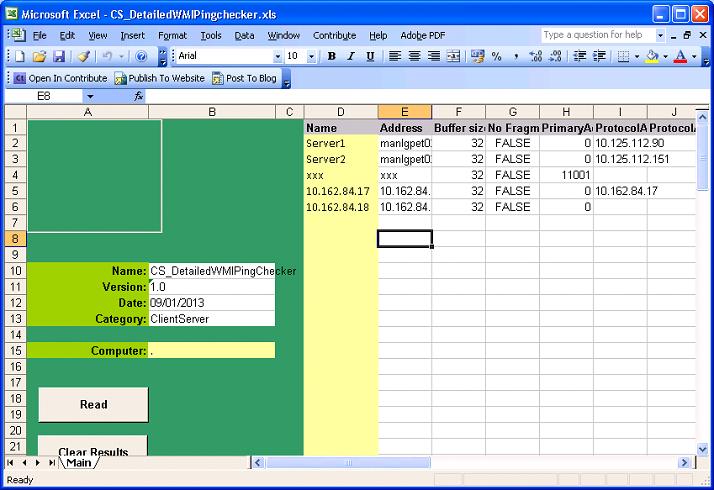The CS_DetailedWMIPingChecker spreadsheet allows a list of hosts to be pinged sequentially and the results compared from host to host. More detailed ping information is collected
The control buttons on the left hand side perform the following function:
|
Button |
Functionality |
|
Read |
Pings the Hosts in Column D and outputs the results to column E. Each new time read is selected then the next available column to the right will be timestamped and the millisecond response time will be populated in that column. |
|
Clear Results |
Deletes the results from column E and higher |
The computer specified in Cell B15 is the name of the computer where the ping is to take place. To select the local computer a full stop is specified (.). If a remote computer is required to perform the ping then specify its NetBIOS name, administrator access will be required to remote computers.
Populate a list of hosts in column D, the hosts can be listed by either FQDN, hostname or IP Address. (e.g. server1.sourcedom.com or server1 or 10.1.2.3).
Select the read button to start pinging and the current results will be populated in columns E and higher.
|
|
Value |
Type |
Description |
||||||||||
|
E |
Address |
String |
Value of the address requested. The form of the value can be either the computer name ("wxyz1234"), IPv4 address ("192.168.177.124"), or IPv6 address ("2010:836B:4179::836B:4179") |
||||||||||
|
F |
Buffer size |
Uint32 |
Buffer size sent with the ping command. The default value is 32 |
||||||||||
|
G |
No Fragmentation |
Boolean |
If TRUE, "Do not Fragment" is marked on the packets sent. The default is FALSE, not fragmented |
||||||||||
|
H |
PrimaryAddressResolutionStatus |
Uint32 |
Status of the address resolution process. If successful, the value is 0 (zero). Any other value indicates an unsuccessful address resolution |
||||||||||
|
I |
ProtocolAddress |
String |
Address that the destination used to reply. The default is "". |
||||||||||
|
J |
ProtocolAddressResolved |
String |
Resolved address corresponding to the ProtocolAddress property. The default is "". |
||||||||||
|
K |
RecordRoute |
Uint32 |
How many hops should be recorded while the packet is in route. The default is 0 (zero). |
||||||||||
|
L |
ReplyInconsistency |
Boolean |
Inconsistent reply data is reported. |
||||||||||
|
M |
ReplySize |
Uint32 |
Represents the size of the buffer returned |
||||||||||
|
N |
ResolveAddressNames |
Boolean |
Command resolves address names of output address values. The default is FALSE, which indicates no resolution. |
||||||||||
|
O |
ResponseTime |
Uint32 |
Time elapsed to handle the request. |
||||||||||
|
P |
ResponseTimeToLive |
Uint32 |
Time to live from the moment the request is received |
||||||||||
|
Q |
RouteRecord |
String |
Record of intermediate hops |
||||||||||
|
R |
RouteRecordResolved |
String |
Resolved address that corresponds to the RouteRecord value |
||||||||||
|
S |
SourceRoute |
String |
Comma-separated list of valid Source Routes. The default is "". |
||||||||||
|
T |
SourceRouteType |
Uint32 |
Type of source route option to be used on the host list specified in the SourceRoute property. If a value outside of the ValueMap is specified, then 0 (zero) is assumed. The default is 0 (zero).
|
||||||||||
|
U |
Status code |
Uint32 |
See next table |
||||||||||
|
V |
Timeout |
Uint32 |
Time-out value in milliseconds. If a response is not received in this time, no response is assumed. The default is 1000 milliseconds. |
||||||||||
|
W |
TimeStampRecord |
Uint32 |
Record of time stamps for intermediate hops |
||||||||||
|
X |
TimeStampRecordAddress |
String |
Intermediate hop that corresponds to the TimeStampRecord value |
||||||||||
|
Y |
TimeStampRecordAddressResolved |
String |
Resolved address that corresponds to the TimeStampRecordAddress value |
||||||||||
|
Z |
TimeStampRoute |
Uint32 |
How many hops should be recorded with time stamp information while the packet is in route. A time stamp is the number of milliseconds that have passed since midnight Universal Time (UT). If the time is not available in milliseconds or cannot be provided with respect to midnight UT, then any time may be inserted as a time stamp, provided the high order bit of the Timestamp property is set to 1 (one) to indicate the use of a nonstandard value. The default is 0 (zero). |
||||||||||
|
AA |
TimeToLive |
Uint32 |
Life span of the ping packet in seconds. The value is treated as an upper limit. All routers must decrement this value by 1 (one). When this value becomes 0 (zero), the packet is dropped by the router. The default value is 80 seconds. The hops between routers rarely take this amount of time |
||||||||||
|
AB |
TypeOfService |
Uint32 |
Type of service that is used. The default value is 0 (zero).
|
Status code
|
Value |
Meaning |
|
0 |
Success |
|
11001 |
Buffer Too Small |
|
11002 |
Destination Net Unreachable |
|
11003 |
Destination Host Unreachable |
|
11004 |
Destination Protocol Unreachable |
|
11005 |
DestinationPort Unreachable |
|
11006 |
No Resources |
|
11007 |
Bad Option |
|
11008 |
Hardware Error |
|
11009 |
Packet Too Big |
|
11010 |
Request Timed Out |
|
11011 |
Bad Request |
|
11012 |
Bad Route |
|
11013 |
TimeToLive Expired Transit |
|
11014 |
TimeToLive Expired Reassembly |
|
11015 |
Parameter Problem |
|
11016 |
Source Quench |
|
11017 |
Option Too Big |
|
11018 |
Bad Destination |
|
11032 |
Negotiating IPSEC |
|
11050 |
General Failure |
- Details
- Category: Client Server
- Published: 04 November 2013

